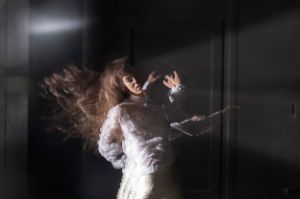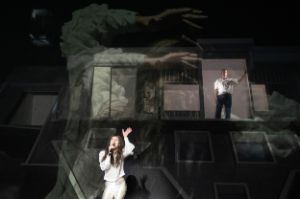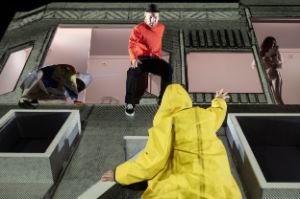Production | 10 remarkable productions
Nora
A thriller by Sivan Ben Yishai, Henrik Ibsen, Gerhild Steinbuch and Ivna Žic
German translation by Tobias Herzberg and Hinrich Schmidt-Henkel
Münchner Kammerspiele, Munich
Premiere 7 October 2022

Nora © Armin Smailovic
Felicitas Brucker and her team stage the story of Nora, who breaks out of the prison of her marriage and life, as a multi-perspective, enthralling theatre thriller, set on a house that increasingly becomes a horror in its own right.
Nora Helmer is in charge of home and children while her emotionally unavailable husband Torvald, a lawyer and soon-to-be bank director, provides for the family. She is almost at the point of solving a troublesome situation: In order to finance a hospital stay of her husband’s, she took out a loan without his knowledge several years ago. The final instalment is now due. But suddenly, Nora finds herself under pressure and has to reconsider her relationship and her life.
Ibsen’s play about a woman who breaks out of her patriarchal prison has several endings that all consider the question of whether to stay or to go. Felicitas Brucker’s multi-layered, high-contrast production masterfully plays on the devices of the theatre. Dramatists Sivan Ben Yishai, Ivna Žic and Gerhild Steinbuch have contributed new texts that contain elements such as a chance for the domestic staff and Nora’s children to speak and a new, contemporary edit to the final scene. Themes like hierarchical structures, hardened role patterns and unvoiced internal conflicts are thus given more space than in Ibsen’s play from the year 1879. The cast of Münchner Kammerspiele give powerful and precise performances in an impressive set that is continually transformed by the use of video projections.
Statement of the Jury
“What kind of person’s story would be about nothing but giving up?” – Katharina Bach asks with fighting spirit – and she never stops fighting. She plays the bank director’s spouse Nora Helmer as a flaming athlete of emotions and a harpy-like gothic queen with a lower- pitch version of ABBA’s “S.O.S.” on her lips. By hook or crook, Nora tries to escape the corset that she has been laced into as a woman, a wife and a piece of inventory in a house that plays the second lead of this production. Set designer Viva Schudt has it standing on its head, or rather, on its roof, forcing the cast to climb, kick and stumble. Instead of rewriting large areas of Ibsen’s text, authors Sivan Ben Yishai, Ivna Žic and Gerhild Steinbuch have added isolated complements, and Ben Yishai’s prologue wittily infuses the issue of class into the play. Felicitas Brucker has succeeded in creating a show that deals with economic and social struggle for survival on many different levels. An acoustically and visually electrifying trip, a virtuoso upending of society, house and soul.
Tojuror Sabine Leucht’s video statement in the Berliner Festspiele Media Library (in German)
Programmebooklet (pdf, 0.5 MB)
Artistic Team
Felicitas Brucker – Director
Viva Schudt – Stage and Costume Design
Markus Steinkellner – Music
Christian Schweig – Lighting Design
Florian Seufert, Maurizio Guolo – Video
Tobias Schuster – Dramaturgy
With
Bernardo Arias Porras – (instead of Thomas Schmauser), Katharina Bach, Svetlana Belesova, Vincent Redetzki, Edmund Telgenkämper
Performing rights:
“Nora: Prolog” by Sivan Ben Yishai
German translation by Tobias Herzberg
Suhrkamp Theater Verlag, Berlin
“Nora” by Henrik Ibsen
German translation by Hinrich Schmidt-Henkel
Rowohlt Theater Verlag, Hamburg
“Noras Kinder“ by Ivna Žic
rua. Kooperative für Text und Regie, Berlin
Rights for Gerhild Steinbuch’s texts: Rowohlt Theater Verlag, Hamburg
The texts written by Sivan Ben Yishai, Gerhild Steinbuch and Ivna Žic were commissioned by Münchner Kammerspiele.



